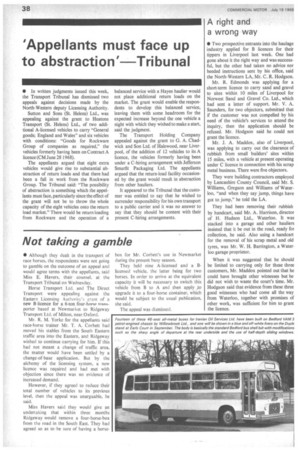A right and a wrong way
Page 40

If you've noticed an error in this article please click here to report it so we can fix it.
• Two prospective entrants into the haulage industry applied for B licences for their tippers in Liverpool last week. One had gone about it the right way and was successful, but the other had taken no advice nor heeded instructions sent by his office, said the North-Western LA, Mr. C. R. Hodgson.
Mr. R. Edmonds was applying for a short-term licence to carry sand and gravel to sites within 10 miles of Liverpool for Norwest Sand and Gravel Co. Ltd., which had sent a letter of support. Mr. V. A. Saunders, for two objectors, submitted that if the customer was not compelled by his need of the vehicle's services to attend the inquiry, then the application should be refused. Mr. Hodgson said he could not grant the licence.
Mr. J. A. Maddox, also of Liverpool, was applying to carry out the clearance of rubbish from small builders' sites within 15 miles, with a vehicle at present operating under C licence in connection with his scrap metal business. There were five objectors.
They were building contractors employed by Lancashire County Council, said Mr. S. Williams, Gregson and Williams of Waterloo, "and when they say jump, things have got to jump," he told the LA.
They had been removing their rubbish by handcart, said Mr. A. Harrison, director of H. Hudson Ltd., Waterloo. It . was stacked into a garage and other hauliers insisted that it be out in the road, ready for collection, he said. Also using a handcart for the removal of his scrap metal and old tyres, was Mr. W. H. Barrington, a Waterloo garage proprietor.
When it was suggested that he should be limited to carrying only for these three customers, Mr. Maddox pointed out that he could have brought other witnesses but he did not wish to waste the court's time. Mr. Hodgson said that evidence from these three good witnesses who had come all the way from Waterloo, together with promises of other work, was sufficient for him to grant the licence.




















































































































